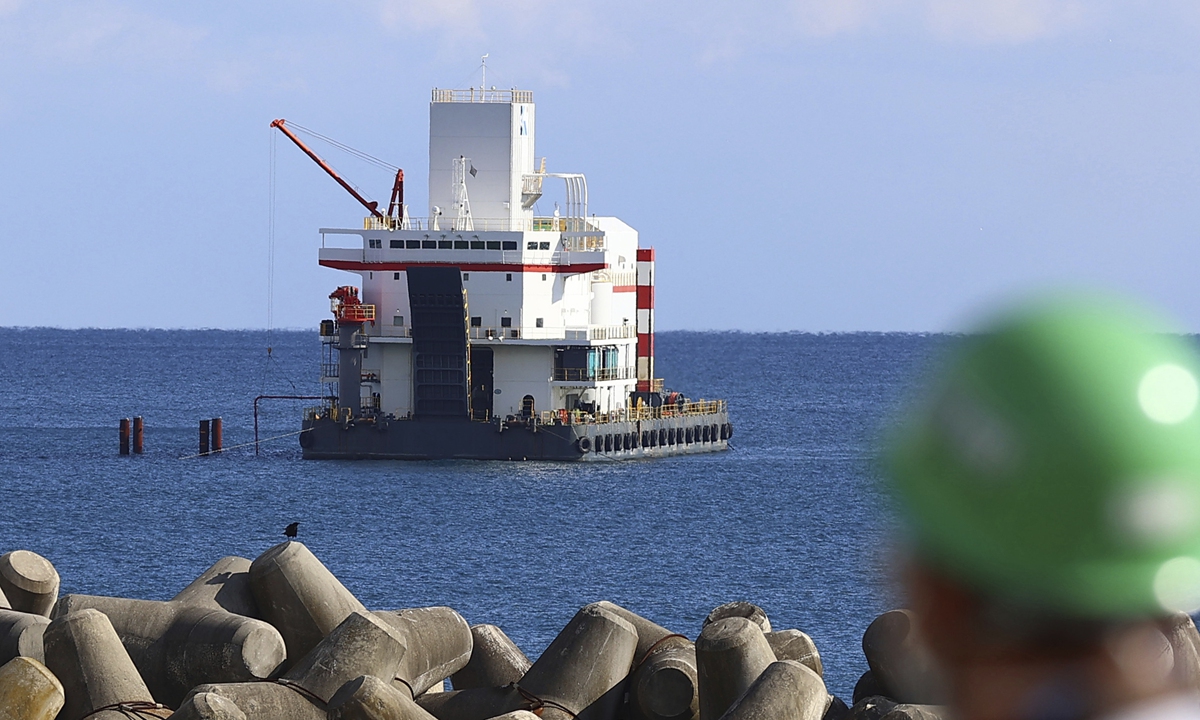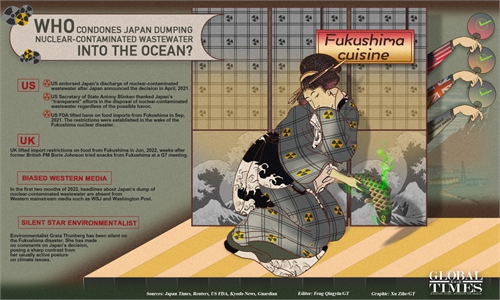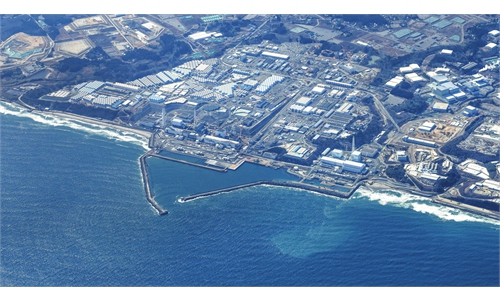China urges Japan not to arbitrarily dump nuclear-contaminated wastewater: Chinese officials at IAEA meeting

Tokyo Electric Power Co (TEPCO) builds a discharge tunnel for nuclear-contaminated water from the crippled Fukushima No. 1 Nuclear Power Plant in Futaba town, Fukushima Prefecture, Japan, on January 31, 2023. China and other countries have repeatedly urged Japan to stop its irresponsible plan. Photo: VCG
Two Chinese officials on Monday urged Japan not to arbitrarily start dumping nuclear-contaminated wastewater from the Fukushima Daiichi nuclear power station into the Pacific Ocean, criticizing move "an extremely irresponsible act that has drawn grave concerns from the international community and relevant countries."
Liu Jing, deputy director of the China Atomic Energy Authority, told a meeting of the International Atomic Energy Agency (IAEA) Board of Governors that Japan's nuclear-contaminated water dump plan is not purely a domestic matter, but concerns the global marine environment and public health, Xinhua News Agency reported on Tuesday morning.
Liu said the IAEA has neither completed its assessment of Japan's disposal plan nor drawn specific conclusions, and all its three reports published so far pointed out the plan's non-compliance with the agency's safety standards and suggested improvement.
However, Japan has arbitrarily approved its own plan and expedited the construction of discharge facilities, ignoring the authoritative advice from the IAEA and the opposition from both home and abroad, Liu said.
Noting that China supports the IAEA's work on Japan's discharge plan, the Chinese nuclear official said he hopes the agency will continue to perform its duties in an objective and impartial manner, listen to the opinions of stakeholders, strictly implement the agency's safety standards and international good practices, and help the international community ensure absolute safety.
Liu stressed that Japan's plan to dump contaminated water into the ocean is not the only feasible way of disposal, and Japan should not use the assessment from the IAEA technical task force as a free pass on its discharge plan.
He urged Japan not to distort the reports of the IAEA task force to justify its discharge plan, nor ignore suggestions from the task force, nor set a deadline for the release of the task force's final assessment report.
Noting that the disposal of the contaminated water will span a long time and involve many uncertainties, he said that Japan should allow effective international supervision on the water disposal, address the legitimate concerns of its neighbors and Pacific island countries, and hold meaningful consultations with stakeholders.
Li Song, China's permanent representative to the United Nations in Vienna, also decried Japan's "extremely irresponsible act" of pushing ahead with its discharge plan despite international opposition, according to Xinhua.
Li urged Japan to respond to the concerns of the international community and refrain from arbitrarily discharging nuclear-contaminated water into the ocean.
Such water disposal is a highly controversial issue that needs to be seriously and prudently addressed by the international community and IAEA member states, the Chinese envoy said.
Instead of endorsing Japan's discharge plan, the IAEA should maintain its scientific, impartial and transparent approach and lead the establishment of a long-term international monitoring system that involves laboratories and experts from China and other stakeholders, he said.
China will participate in the relevant work of the IAEA with a strong sense of responsibility, Li said.
China's Foreign Ministry on Monday urged Japan to deal with the nuclear-contaminated wastewater from the destroyed Fukushima nuclear plant in an open, transparent, scientific and safe manner, saying it must not start discharging the water into the sea before a proper solution is fully discussed and agreed by neighboring countries and relevant international institutions.
The FM Spokesperson Mao Ning reaffirmed China's serious concern and firm opposition to Japan's one-sided decision on Wednesday's press conference, when asked to comment on the Japanese government which has neither changed its decision to release more than one million tons of contaminated water into the ocean, nor responded properly to the concerns of international community.
Japan has accumulated more than 1.3 million tons of nuclear-contaminated wastewater, and it could take more than 30 years to release it all into the ocean. The nuclear-contaminated water contains more than 60 radionuclides, which will spread to the sea all over the world after 10 years of discharge, causing unpredictable harm to the global marine environment and human health, Mao remarked on Monday.
Countries including China, South Korea, Russia and some Pacific island nations have shared concerns; multiple Japanese civil organizations launched a petition with the signature of 180,000 Japanese people to resist the discharge; and Japan's fisheries federation has repeatedly expressed strong opposition, said Mao.
According to TEPCO, the total amount of the nuclear-contaminated water in Fukushima reached 1.32 million tons at the moment and continued to increase, and the contaminated water would be diluted with seawater if discharged.


